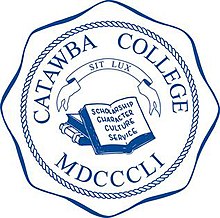Catawba College
 |
|
| Motto | Scholarship. Character. Culture. Service. |
|---|---|
| Type | Private |
| Established | 1851 |
| Affiliation | United Church of Christ |
| Endowment | $55 million |
| President | Brien Lewis |
|
Academic staff
|
69 |
| Students | 1,306 |
| Location | Salisbury, North Carolina, US |
| Sports | NCAA Division II, South Atlantic Conference |
| Colors | Catawba blue and white |
| Nickname | Cat–U |
| Affiliations | United Church of Christ |
| Website | www |
Catawba College is a private, coeducational liberal arts college in Salisbury, North Carolina, United States. Founded in 1851 by the North Carolina of the Reformed Church in Newton, the college adopted its name from its county of origin, Catawba County, before moving to its current home of Salisbury in 1925.
Today, Catawba College still holds loose ties with the successor to the Reformed Church, the United Church of Christ, and offers over 70 undergraduate degrees. It also recently added a nursing program.
Catawba College was founded by the North Carolina Classis of the Reformed Church in the United States in 1851. The years following the opening of the college were years of growing prosperity for the school, but the Civil War changed this as funds and students became less available. During the war years, the college became an academy, operating as Catawba High School from 1865 until 1885, whereupon it resumed operations under its original charter as Catawba College. Catawba became coeducational in 1890. Even with the addition of women to the student body, the College struggled to overcome the depletion brought on by the war. Responding to the offer of a partially constructed dormitory-administration building and several acres of land in Salisbury, trustee, college, and church officials closed the campus in Newton in 1923 and re-opened in Salisbury in 1925.
The college is now affiliated with the United Church of Christ, the successor to the Evangelical and Reformed Church, itself the successor to the Reformed Church in the United States.
Catawba College offers over 70 fields of study in a variety of disciplines, including Accounting, Administration of Justice, Athletic Training, Biology, Business Administration with concentrations in Accounting, Communication, Economics, Entrepreneurship, General Management, Information Systems, International Business, Marketing, Entrepreneurship; Chemistry, Communication Arts, Computer Science, Economics and Finance, Education: Elementary K-6, Education: Middle School 6-9 with specializations in Language Arts, Mathematics, Science, and Social Studies; Education: Special Education, Licensure Programs (Secondary Subjects 9-12), Special Subjects (K-12), Environment and Sustainability with concentrations in Environmental & Outdoor Education, Environmental Science, Natural Resource Management, Sustainable Planning & Leadership, Exercise Science, History, Integrated Marketing Communication, Literature, Mathematics, Mathematical Finance, Music with concentrations in: Music Business, Music Education, Music Performance, Popular Music, Sacred Music, and Worship Arts; Musical Theater, Nursing, Physical Education, Politics with concentrations in Pre-Law and Public Administration; Psychology, Recreation, Religion and Philosophy with concentrations in Christian Ministries and Theology/Philosophy; Sociology, Spanish, Sports Management, Theatre Arts with specializations in Theatre Arts, Performance, and Design/Production; Theatre Arts Administration, Theatre Arts Education, Therapeutic Recreation, and Writing.
...
Wikipedia
